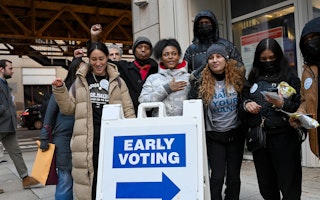How U.S. States and Cities Can Shore Up Civil Rights
By Jill Habig

Last week, President Trump launched an extraordinary attack on a perceived enemy: California.
There are numerous policy areas in which the Golden State and the federal government are heading in opposite directions. But the rift seems deepest on the subject of immigration—and particularly the president’s hostility toward the local jurisdictions in California with “sanctuary city” policies exempting local officials from cooperating with federal efforts to detain undocumented immigrants.
“Governor Brown does a very poor job running California,” Trump said, during a visit to review models of the border wall he called for during his campaign. “The place is totally out of control.”
What’s out of control is the administration’s determination to roll back rights. Trump’s comments came on the heels of a lawsuit filed on March 6 by Attorney General Jeff Sessions, arguing that California law illegally limits federal immigration enforcement. A recent draft strategic plan for Sessions’s Justice Department removed civil rights enforcement and criminal justice reform from its list of priorities. Elsewhere, the administration has upended civil rights and consumer protections, rules relating to fair treatment in the workplace, and regulations on clean air and water.
And the Republican-controlled Congress is following suit. Last fall, the Senate repealed a Consumer Financial Protection Bureau rule that allowed consumers to file class actions against banks and other financial companies, capping a decades-long effort by conservatives to shut Americans out of court and provide corporations de facto immunity for fraud and deceit.
These attacks on rights aren’t happening by accident. They are the result of an intentional, long-planned effort to reduce the role of the federal government in enforcing basic legal protections, and to starkly limit access to courts for others. This double-edged effort has created an enforcement vacuum: you can’t sue, and the federal government won’t sue on your behalf, either.
So, what can we do? Public Rights Project, a nonpartisan nonprofit that I formed last year, has an answer to this question.
State and local governments have key tools to protect our rights. State attorneys general, district attorneys, county counsels, and many city attorneys have authority to prosecute corporations for civil and criminal wrongdoing, and they often have broad jurisdiction to address civil rights violations. They are not constrained by arbitration clauses or class action restrictions, so state and local governments often can step in when private and nonprofit groups can’t pursue a case.
States and cities have scored some huge wins in recent years. They have ended predatory behavior by for-profit colleges and forced payday lenders to change their illegal practices. They have secured marriage equality across the country and preserved the Affordable Care Act. They have also stalled the Trump administration’s efforts to ban immigration from predominantly Muslim countries and have protected sanctuary cities.
There is much more states and cities could do, if they had the resources and the determination to balance public rights enforcement with other priorities. Lawyers interested in public service are not always aware that state and city offices have this kind of power.
I formed Public Rights Project to help bridge this enforcement gap. We empower state and cities to protect the rights and freedoms that define us as Americans by providing them with the resources they need to do this important work. Specifically, we recruit and train talented attorneys to serve two-year fellowships in state and local government offices. And we work with these offices to bring high-impact cases to protect peoples’ rights.
States and cities play both offense and defense. Under President Trump, they are battling more pronounced abuses of rights. Under President Obama, action at the state and city level was needed because the federal government could not investigate all the police departments in need of reform, nor could it protect consumers from all predatory businesses.
As we invest in civil rights organizations to vindicate the rights of vulnerable communities in courtrooms across America, we need to also invest in a better pipeline to help talented, public interest–minded attorneys enter public service locally.
As a legal fellow in the San Francisco City Attorney’s Office, I worked on the trial team that overturned Proposition 8 to bring marriage equality to California. Years later, I helped build the Bureau of Children’s Justice in the Attorney General’s Office, a unit dedicated to enforcing children’s rights. And now, in Public Rights Project’s first case, we are representing the City of Gary, Indiana, working to defend their “welcoming city” ordinance and protect public safety for all city residents regardless of their immigration status. I have seen the power states and cities can have when they have resources to do this work.
In the end, cities and states can help pick and win some of the important civil rights fights of our time. They can help bend the arc of the moral universe, but only if we recognize and address the need to help them in the fight.
Public Rights Project is a grantee of the Open Society Foundations.
Jill Habig is an Open Society Leadership in Government Fellow and the founder and president of Public Rights Project.


